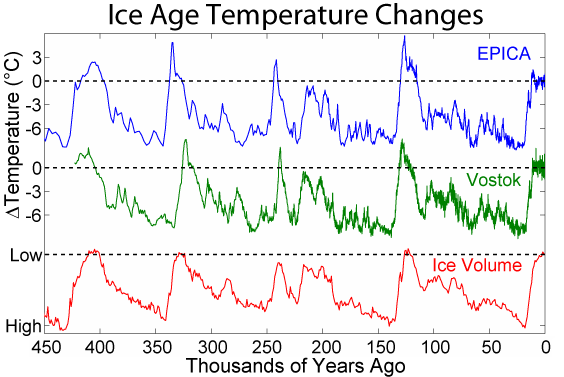
There are also big changes going on in the far north
...Temperatures are rising in the North Atlantic, and the permafrost soil in Siberia, Canada and Alaska is softening. According to the Intergovernmental Panel on Climate Change (IPCC), the Arctic is subject to "stronger and faster warming than any other region."
Arctic animal and plant species must adjust to far more extreme changes than elsewhere -- or face the threat of extinction. It is not surprising that the polar bear has become a symbol of climate change.
People also live in the Arctic region. The Inuit are the ancestral settlers of the north. They number about 100,000 and are scattered across Alaska, Canada, Greenland and Siberia. Their familiar habitat is sinking as the permafrost soil softens.
Some stand to benefit from the end of the ice era. As if awakening from a deep sleep, the five nations bordering the Arctic -- the United States, Russia, Canada, Norway and Denmark -- are already grasping for new riches:
* As the wheat farming zone shifts farther to the north in Siberia, the Russians are looking forward to rich harvests.
* Farmers in Greenland recently began growing potatoes and broccoli, making the territory less dependant on shipments from the south.
* US aluminum producer Alcoa plans to build a huge aluminum smelter near Greenland's capital city, Nuuk. Hydroelectric power from melting glaciers will provide the electricity for the plant.
* As the ice melts, previously impassable shipping routes become navigable. Large amounts of money and effort are already being poured into expanding ports like Murmansk, Churchill and Hammerfest.
* Most of all, the Arctic is releasing unimagined amounts of resources, especially oil and gas, but also various ores.
...From the pragmatists' standpoint, the Arctic Ocean is opening up at just the right time. Exploding prices are fueling an onslaught on the riches of the North. The British-Dutch energy conglomerate Shell, for example, spent a record sum of $2 billion (€1.4 billion) for licenses in the Chukchi Sea north of the Bering Strait.
Energy multinational BP recently spent $1 billion (€700 million) for oil exploration rights in the pack ice in Canada's Mackenzie River estuary region. A $16.2 billion (€11.3 billion) pipeline will connect the new energy-producing region with areas to the south. The Danish company DONG Energy A/S began collecting seismic data in Disko Bay on the west coast of Greenland.
A forecast issued by the US Geological Survey (USGS) in July has ignited both fascination and greed. For the first time, the agency provided a detailed estimate of the Arctic region's oil and gas potential. The USGS concludes that the region north of the Arctic Circle holds the equivalent of 412 billion barrels of oil, or close to one-quarter of the world's undiscovered but technically reachable oil and gas reserves. This is significantly more than proven reserves in Saudi Arabia...
The newbies in Michigan all complain about the winter because we've had a few subzero nights.
Ten thousand years ago there were wooly mammoths and a polar ice cap down to the Ohio River.
...While an ice sheet on Antarctica began to grow some 20 million years ago, the current ice age is said to have started about 2.58 million years ago. During the late Pliocene the spread of ice sheets in the Northern Hemisphere began. Since then, the world has seen cycles of glaciation with ice sheets advancing and retreating on 40,000- and 100,000-year time scales called glacials (glacial advance) and interglacials (glacial retreat). The earth is currently in an interglacial, and the last glacial period ended about 10,000 years ago. All that remains of the continental ice sheets are the Greenland and Antarctic ice sheets...

Nobody notices that of the native American flora, bald cypress survives winter cold down to -35oF. Their old growth forests are in the swamps of Louisiana- but you can grow them just fine in Michigan, too. It's just the last forests in Michigan got wiped out by the kilometer of ice 20,000 years ago.

Not to dismiss the seriousness of sudden global warming. but swinging the pendulum the other direction could be equally or more disasterous as well.

No comments:
Post a Comment